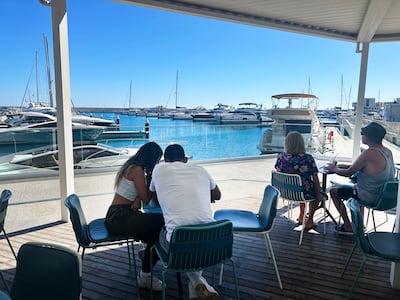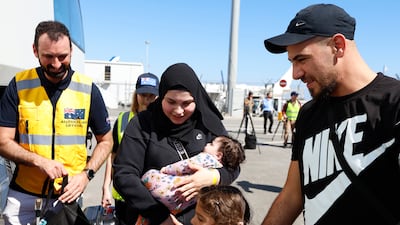Live updates: Follow the latest on Israel-Gaza
Under a blazing sun and clear skies, the Mediterranean coast of Cyprus provides Europe's final taste of summer.
In the bustling seaside cities of Limassol and Larnaca, where restaurants serve everything from German flammekueche to full English breakfasts and Greek specialities, local residents take pride in offering a neutral haven for those seeking respite from conflict.
“What is positive is that whether they are Lebanese, Israeli, Russian or Ukrainian, here in Cyprus, they are all smiling,” said Marios Konstantinidis, manager of a restaurant near the Limassol marina.
Popular with international tourists, the number of arrivals from Lebanon to Cyprus has soared after relentless Israeli bombing displaced about a third of the population. Countries including the UK, France, Russia and Australia have chartered special flights for their citizens wishing to leave Lebanon but have not announced a total evacuation.
For the Lebanese, flights departing Beirut are scarce and dangerous. Only one company, national carrier Middle East Airlines, still operates in Beirut, despite heavy Israeli bombing around the international airport. The flights have become a source of pride for many on social media, where they have been described as heroic.
Another option is by sea. About 40 people arrived in the past two weeks at Larnaca marina on charter yachts from Beirut, paying up to $1,800 for a one-way seat before going straight to the airport. Such trips do not happen normally, marina sources said. “Rich people have started to arrive,” they said. “The poor, they stay in Lebanon.”
The most fortunate Lebanese have come with their own yachts. Larnaca marina is currently full, so many have moored in the recently opened luxury Ayia Napa marina, where filters keep the water a stunning turquoise.
No politics by the sea
Ralph, 69, and five members of his family recently enjoyed lunch at the marina before most of the group travelled to Canada. They had been visiting Lebanon when Israel started bombing Beirut. Taking a plane, they decided, was too risky. So they set sail last week from Dbayeh, a port north of Beirut, in Ralph's three-bedroom yacht.
“We belong to the privileged few,” said Joanna, 71. Ralph and his wife had planned to head back to Beirut to pick up their adult children before returning to Ayia Napa later this week. They want to live on their yacht in Cyprus as they wait for the bombing to end.
But they worry that Lebanese authorities will start restricting departures by sea for reasons that remain unclear. “They asked me for an extra certificate of seaworthiness and are reducing the number of people per boat,” said Ralph.
His cousin, Nouhad, said: “Maybe they’re jealous we’re getting away and they’re not." They were the only yacht to sail from Dbayeh on Thursday despite large numbers departing in the previous days.
Sitting in a cafe nearby, an Israeli yacht owner said he was aware that he shared the marina with Lebanese people fleeing the bombardment of their capital by his country. The port's administrators have discouraged boat owners from flying their national flags, citing security concerns.

Speaking carefully and avoiding mention of the war, the Israeli yacht owner, who has lived on his boat for 12 years, said he had chosen Ayia Napa for its calm and beauty. “When you live by the sea, there are no politics,” he said.
Asked about how they feel sharing the marina with Israelis in Cyprus despite Lebanese law barring all contact, his Lebanese neighbours appeared unperturbed. “In both countries, it's neither me nor the average Israeli that is doing the fighting,” said Maya, 69.
Lebanese society is deeply divided between critics of Hezbollah, which Israel says it is targeting in its bombing campaign, and the group's supporters. Lebanon never signed a peace treaty with Israel after the 1948 Arab-Israel war and borders are closed.
In the streets of Larnaca, where both Hebrew and Arabic can be heard in the crowd alongside English, Russian and Greek, pinpointing who is in Cyprus because of the war in their home country and who is on holiday is a difficult exercise.
Open-ended holidays
Sitting on a bench facing the sea, an elderly Beiruti couple who visit their son living in Nicosia every year have seen their one-week holiday extend to three weeks. They are not sure when they will return. Their son, Raghid, 30, moved to Cyprus a decade ago for his studies, and later, work. “Most Lebanese who have come to Cyprus recently already have permanent residence and are familiar with the country,” he said.
Raghid is stateless because his father is Palestinian, born in Acre in 1947, one year before the establishment of the Israeli state. Except for some rare exceptions, Lebanon has never granted citizenship to Palestinian refugees. His mother is Lebanese but Lebanese women cannot pass on citizenship to their children.
His parents, who live in the Beirut neighbourhood of Cola, which was bombed last week by Israel, appear reluctant to admit their lives have been affected by the war.

“We'll see how long it lasts,” said Raghid's father, who declined to give his name. “I'm still waiting for my right to return,” he added, with a shrug. The creation of the state of Israel led to the expulsion of about 700,000 Palestinians. Under international humanitarian law, they have the right of return – a concept that Israel rejects.
In Cyprus, Raghid prefers to avoid Israelis. “You'll find adaptability, but not acceptance,” he said, highlighting that Lebanese and Israelis, though both investors in Cypriot real estate, will never do business together because of Lebanese laws.
Among the Lebanese, the antipathy towards Israel has been heightened by recent events, including the rigging of pagers and walkie-talkies with explosives last month, which killed and maimed thousands of Hezbollah members and civilians.
Raghid's mother, Sahar, 66, looks at her mobile phone with suspicion. Like many Lebanese, she worries that Israel is eavesdropping on her conversations and that the outcome may be fatal. “We need to leave it all behind us,” she said.


